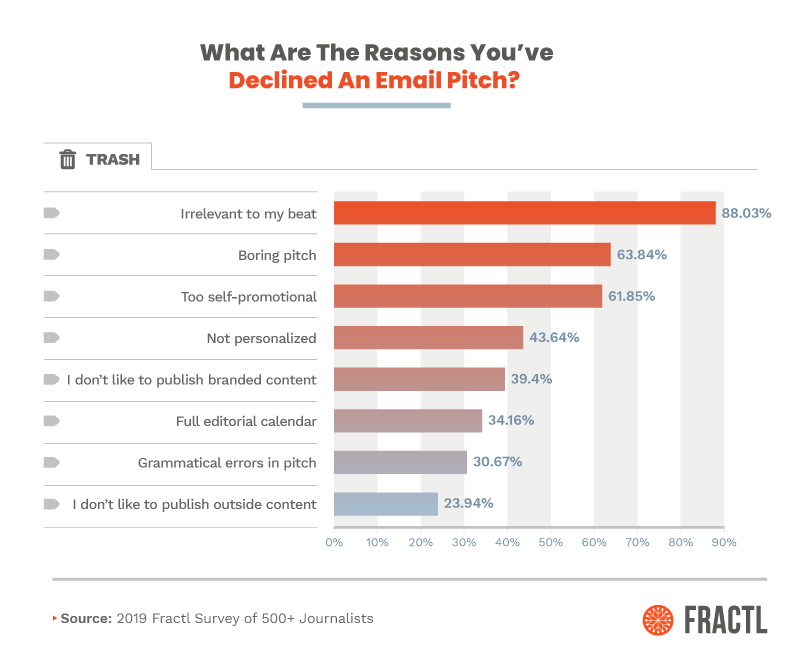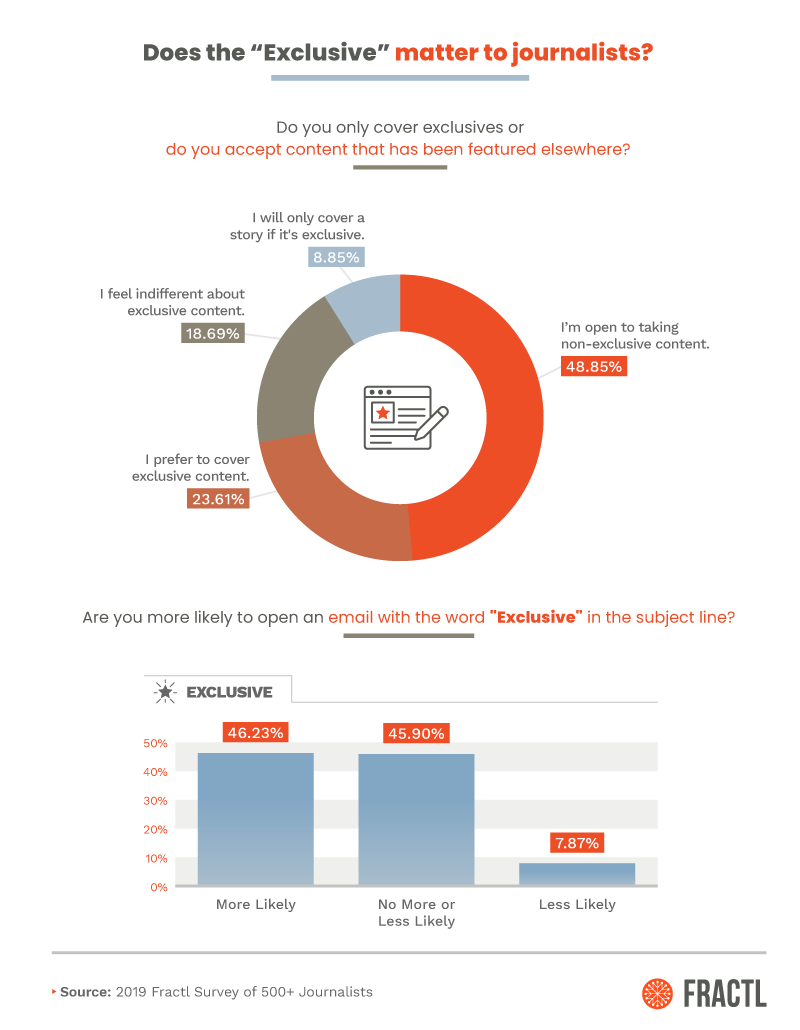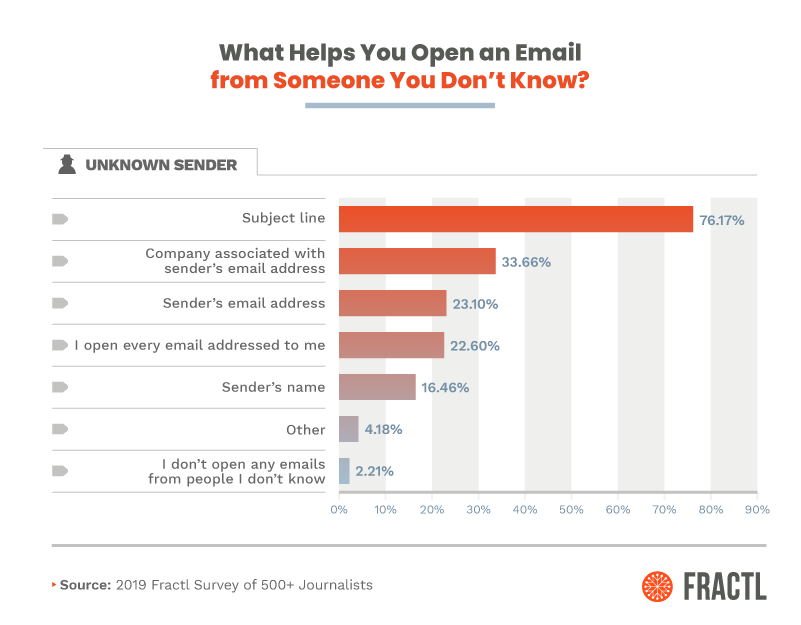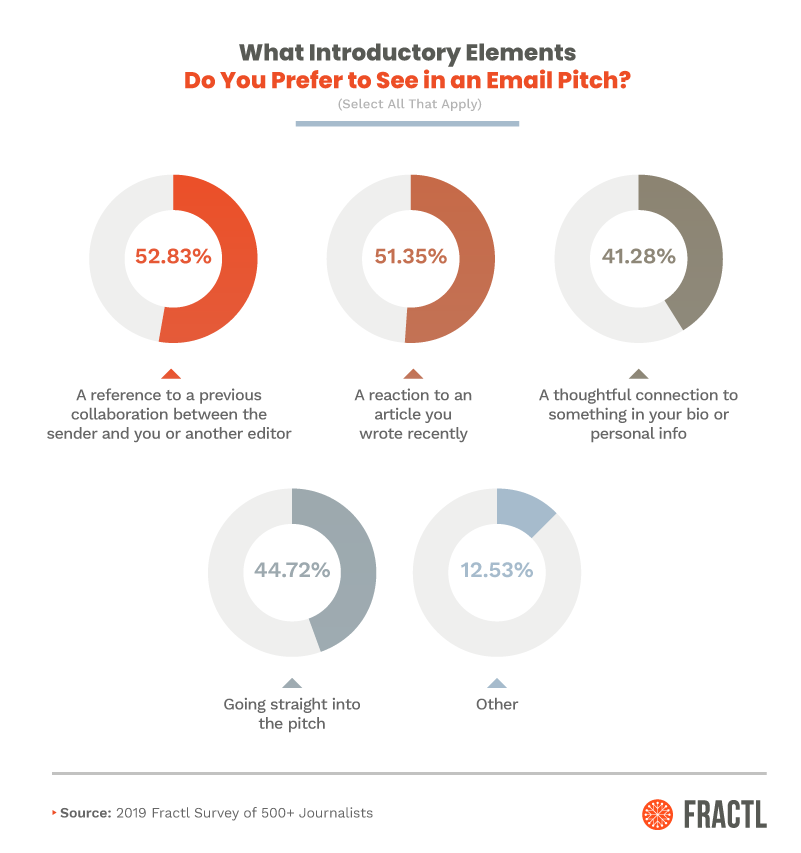Subject line writing is not something you carelessly come up with at the last minute.
One more time, for emphasis: Subject line writing is not something you carelessly come up with at the last minute.
Why? It’s one of the most important, if not the most important part of your outreach strategy for pitching content marketing campaigns.
Did you know that only 22% of journalists open every single email addressed to them? Time and time again, writers reveal that the most important factor when deciding whether or not to open an email from an unknown sender is the subject line. And we have the data in this report to back it up.
If you Google the phrase “how to write an email subject line,” thousands upon thousands of results await your attention. With this exclusive report, you can save yourself the energy expended through endless scrolling.
We surveyed 500+ journalists, editors, and online writers to learn more about their email pitch preferences in 2019. Read on to learn how to best serve them with your subject lines and the body of your pitch.
Subject Line Appeal
In our survey, we provided 3 real-life examples of subject lines that fall under three different categories. We also included “Personalized” to denote any subject line that is hand-crafted for the individual journalist. Let’s break down the definitions of each type first.
- Statistic: Used for content that features data.
- Information Gap: Based on the “information gap theory of curiosity,” tempting journalists to find out more and click on your email.
- Content Title: Explains the content of your pitch in a straightforward way.
- Personalized: Based on personal information you discovered about the writer via his or her digital footprint.
From the Fractl Blog: How to Write an Email Subject Line for Link Building and Content Marketing Outreach
Our findings show that journalists preferred the statistic-based subject line more than any other type. TLDR: Include data in your content!
Avoid a Rejected Pitch
The number one reason a journalist or online writer says they decline a pitch is that it’s irrelevant to their beat. The second and third most common reasons are that it’s too boring or it’s too self-promotional.
The big takeaway here is to do your research and know the people you are pitching to. Learning more about your target writers and publishers can give you insight into their interests and how they like to communicate.
The “Exclusive”
When it comes to the exclusive, it doesn’t hurt to offer it and mention it outright in your Subject Line. About 46% of writers would be more likely to open an email with the word “exclusive” in it while less than 8% of writers are flat out not interested in exclusive content. About 31% of people prefer to or only cover exclusive content, so make sure when you say something is exclusive, you mean it.
Unknown Sender
We found that 22% of journalists open every single email addressed to them, proving the importance of capturing their genuine interest.
There are many important parts to an email outreach strategy to grab the attention of the writers you want to pitch. The coveted subject line is becoming more and more important—76% of writers open an email based on the subject line. Around a third of the journalists we surveyed say they open an email based on the company associated with the sender’s email address.
If your team dedicates themselves to sending personalized, targeted, and relevant pitches often, these findings are a great indicator that you’re doing the best you can. If your team doesn’t pay attention to these things, you might want to change something up.
Best Email Intro Practices
When it comes to writing the introduction to your email, how can you keep it short and sweet while still making a thoughtful connection to the writer? One way to show a writer you’ve read their work is by commenting on a past article they wrote. And, even better—if you’ve already worked with this journalist in the past, 52% of writers want to know that.
Conclusion
To recap, here are some of the strongest takeaways from our research.
- Most people (76% of writers) open an email based on the subject line.
- When pitching content, the statistic-based subject line is the most powerful type of subject line you can use during outreach.
- The top three reasons journalists decline your pitch is because it’s irrelevant, boring, or too self-promotional—88% of writers have rejected a pitch for it being unrelated to their beat.
- The exclusive matters for around a third of journalists—31% of people prefer to or only cover “exclusive” content.
- Only 22% of digital writers open every single email addressed to them.
- 52% of writers would like you to remind them of your past working relationship in the introduction of your pitch.
Want even more tips? Download our free whitepaper guide to writing “winning” subject lines!
Methodology
We collected over 500 responses from online journalists, writers, and bloggers (either employed by an online publisher or working as a freelance contributor). We asked respondents a series of questions about PR pitches and their work in online publishing.








